By Scott McClanahan, Ed.D.
In the spring of my senior year, I noticed a trend amongst my classmates: they were all discussing college incessantly. I, however, was not. As the son of a factory worker and a retail sales clerk (neither of whom attended college), I was not having those discussions at my house. I had not met with my guidance counselor for college advice nor had I been approached by any outside entity to help me navigate the college process. My sole source of information was the copious college propaganda that arrived in the mail each day. Impressed by beautiful pictures, stories of campus activities, and lists of amazing opportunities available at the various institutions, I tried to determine where to go, even though I knew my family did not have the financial resources for me to attend. It was not until April of my senior year that I decided on a state school 90 minutes from home; however, by that time, the dorms were full nor had I been awarded financial aid, forcing my parents and me to navigate the worlds of off-campus housing, financial aid, payment plans, and books on our own.
But that was 30 years ago. And we hope — for the large majority of today’s students — circumstances are different. However, an occasional student still moves through the high school system and never receives the message that college is both valuable and available, despite any hardships possessed.
As President of the Heart of Texas P-20 Council, I can confidently state that administrators around the region sponsor fantastic College Readiness programs to assist their students: college and career fairs to motivate students to pursue higher education, college testing (such as ACT, SAT, and ASVAB) preparation that opens opportunities at higher education institutions or in the military, and specialized career preparation classes. From rigorous Career and Technical Education programs, to Advanced Placement and Dual Credit course offerings, to Early College High Schools and early degree programs, our region is leading the charge to impact every student. Today’s local students find it increasingly more difficult to make it through to high school graduation without ever hearing about college, without receiving information about paths to college, or without their post-graduation plans being questioned (usually multiple times).
These conversations are part of our region’s efforts to meet the requirements of the State of Texas’s 60x30TX initiative, an enterprise to keep Texans competitive in the global economy. The 60x30TX initiative has four goals: increase the education level of Texas’s 25 to 34-year-old population; increase degree completion levels at Texas community colleges and universities; increase the marketable skills possessed by high school graduates; and decrease the amount of student debt accrued by college graduates. The state’s fifteen-year strategic plan encompasses these four goals, all to be achieved by 2030. Although formidable, all are attainable with intense, directed action on the part of K-12 systems, higher education institutions, and the community.
The first goal seeks to increase the number of adults ages 25-34 statewide who hold college degrees (2-year or 4-year) or national workforce certifications to 60% by 2030. In an age where the American Center for Progress reports that one in eight Americans lives in poverty, this type of goal is required. A 2012 Brookings Institute study identified two common characteristics of prosperous communities: residents either held a college degree or had earned a workforce certification, and explained this finding economically in a 2015 report: adults aged 25 to 34 who finish college degrees not only earn more annually but also contribute more to the local economies, causing the whole community to flourish. Similarly, specialized certifications allow workers access to a set of higher-paying jobs. Therefore, the goal makes good sense for all of us. However, the 2018 Texas Public Higher Education Almanac reports that in 2016 (the most recent available data) only 42.3% of Texans 25-34 held a degree or certification. Therefore, it is in all our best interests to encourage the young people in our lives to pursue one of these avenues.
The Heart of Texas P-20 council, whose focus is to collaborate, inform, and advocate for seamless pipelines from prekindergarten to career, engages local K-12 systems Waco ISD, Midway ISD, LaVega ISD, and Connally ISD, local charter schools Harmony and Rapoport, higher education partners McLennan Community College and Texas State Technical College, Prosper Waco, and numerous business representatives in active communication to remove barriers that might exist that prevent students from helping the state to achieve these strategic goals. And, our earnest work toward this mission is seeing results.
At last Tuesday’s McLennan Community College graduation, Rapoport Academy and Waco ISD graduated 13 students with associate degrees before these students had even graduated from their high school.
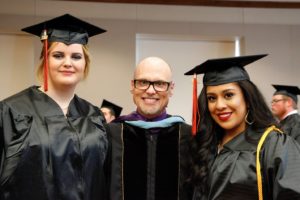
Waco ISD’s two associate degree graduates with me: Kiara Jackson, Waco High School, and Isabella Lozano, University High School. These young women have both claimed the title of first student in their high schools to graduate with an associate degree.
One Waco High School student, Kiara Jackson, achieved this feat in only three years—graduating from high school a year early and from her associate program three years ahead of schedule. The students completed these degrees at no cost to themselves, helping to meet the state’s fourth strategic goal of reducing student debt levels. These students avoided costs by participating in programs offered at their high schools that are free of charge. Rapoport Academy’s Early College High School and Waco ISD’s ACCELERATE Early Degree Program are just two innovative ways that regional educators are creating options for our students to eventually earn more as workers and contribute to their communities at higher levels as consumers.
Questions about these types of programs can easily be answered by a high school counselor or current participant; however, three main misconceptions tend to keep students from taking advantage of these types of opportunities:
How does a student have time to meet all the high school graduation requirements and complete a college degree at the same time? Do they have a longer year, go to night school, or have to attend during the summer? – “Dual credit” classes allow students to earn both high school and college credits at the same time. For example, MCC’s History 1302 can be taken to fulfill both the required credit for high school US History and to complete the U.S. History course requirement for any degree issued at a Texas public college or university. Therefore, with smart planning, students can complete classes that earn credit towards high school graduation and a college degree.
How does a student know what classes will be accepted by universities, particularly out of state? Who will help them navigate that? – McLennan Community College advisors are extremely knowledgeable about transfer credits and acceptance of classes. Advisors are required to meet each semester with students prior to enrollment, once two classes are completed. During this advising, they will ask students what schools interest them and what their anticipated majors will be. From that, advisors will determine the best classes for the students. Parents and students can always verify transfer policies for any college by calling the transfer coordinator (whose name can be found on the college’s website) to discover how transfer coursework will be accepted once the student is admitted to the university.
Does this type of program keep students from participating in other school activities? – Because students are accelerating their instruction (sometimes by up to four grade levels), they should consider limiting participation in some activities, especially those that cause them to miss school frequently or require long practice hours outside of the school day. Since grades in these courses impact the students’ high school and college GPAs, an overloaded schedule many times will avert focus from academics (or cause students to have tremendous worry about those academics) and performance suffers. This does not mean students must give up all extra-curricular activities. They can participate in activities such as band or choir, sports, and clubs; however, they should make wise choices when investing time and carefully evaluate the time commitment required of each activity before committing to it.
Perhaps if these types of opportunities had been offered when I was a senior, I would have taken advantage of them and saved myself a great deal of time, money, and stress. We have programs to help increase college access throughout our community—Communities in Schools, VOICE, Project Link, just to name a few. Parents who did not attend college should not feel embarrassed about asking for guidance on how to help their children navigate this process. We are all in this together: schools, businesses, the P20 council and the State of Texas. Together, we can meet the state’s challenge and meet its lofty goal, while simultaneously helping to make Waco a more prosperous community.
 Dr. Scott McClanahan is the Executive Director of Secondary Curriculum and Instruction for the Waco Independent School District. Originally from the Chicago suburbs, Dr. McClanahan moved to Texas to earn both his Masters degree and Doctorate. He has been a middle school and high school teacher, a community college professor, and a university adjunct professor.
Dr. Scott McClanahan is the Executive Director of Secondary Curriculum and Instruction for the Waco Independent School District. Originally from the Chicago suburbs, Dr. McClanahan moved to Texas to earn both his Masters degree and Doctorate. He has been a middle school and high school teacher, a community college professor, and a university adjunct professor.
The Act Locally Waco blog publishes posts with a connection to these aspirations for Waco. If you are interested in writing for the Act Locally Waco Blog, please email ashleyt@actlocallywaco.org for more information.
By Christine Holecek
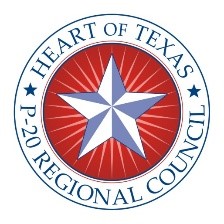 Preparing local students for a successful journey through school and college to careers is critical to the well-being and growth of our community. The Heart Of Texas P-20 works to promote streamlined, transparent degree pathways for students to move quickly and successfully through their education and onto college and/or a career. The Heart of Texas (HOT) P-20 brings together representatives from the independent school districts (ISD), institutions of higher education (IHE), Region 12 Education Service Center, industry and government across six counties: Bosque, Hill, Falls, Limestone, Freestone and McLennan to work towards this goal.
Preparing local students for a successful journey through school and college to careers is critical to the well-being and growth of our community. The Heart Of Texas P-20 works to promote streamlined, transparent degree pathways for students to move quickly and successfully through their education and onto college and/or a career. The Heart of Texas (HOT) P-20 brings together representatives from the independent school districts (ISD), institutions of higher education (IHE), Region 12 Education Service Center, industry and government across six counties: Bosque, Hill, Falls, Limestone, Freestone and McLennan to work towards this goal.
The HOT P-20 mission can best be summarized as follows:
- Collaborating by building cross-community team to address education and career possibilities for all students.
- Informing our diverse communities about ongoing initiatives, best practices and available resources.
- Advocating for educational best practices with at the state and local levels.
Upcoming Activities include
Collaborating:
Heart of Texas P-20 Forum “State of Education Conference” (Session# 146917) – April 26, 2018 – 11:00 to 2:00 – Education Service Center Region 12
Informing:
A look at SAT from a Math Perspective (Session #126532) – February 27, 2018 – 9:00 to – 4:00 – Education Service Center Region 12
21st Century New, Emerging, and Evolving Careers (Session #126482) March 1, 2018 – 9:00 to 12:00 – Education Service Center Region 12
CTE Quarterly Network Meeting (Session #126446) – April 26, 2018 – 9:00 to 11:00 – Education Service Center Region 12
Connect3 Conference – June 6-8, 2018 – ESC Region 12
Counselor Summer Fly-In – June 11-15, 2018 – MCC/TSTC
Advocating (Student Events):
Construction and Welding Expo “Build Your Future” – March 23, 2018 – 8:00 to 3:30 – Greater Waco Advanced Manufacturing Academy
YES! Expo – May 15, 2018 – 8:00 to 4:00 – Extraco Events Center
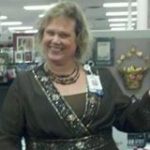 This Act Locally Waco blog post was written by Christine Holecek. Christine is an Education Specialist at Education Service Center Region 12 in Waco. She has worked in the area of Adult Education and Career & Technical Education for the past 25 years. She earned an AAS degree from MCC, a BAAS and Master’s Degree from the University of North Texas and is currently enrolled in the Doctoral Program in Educational Leadership and Policy Studies at Tarleton State University.
This Act Locally Waco blog post was written by Christine Holecek. Christine is an Education Specialist at Education Service Center Region 12 in Waco. She has worked in the area of Adult Education and Career & Technical Education for the past 25 years. She earned an AAS degree from MCC, a BAAS and Master’s Degree from the University of North Texas and is currently enrolled in the Doctoral Program in Educational Leadership and Policy Studies at Tarleton State University.
The Act Locally Waco blog publishes posts with a connection to these aspirations for Waco. If you are interested in writing for the Act Locally Waco Blog, please email ashleyt@actlocallywaco.org for more information.
(The Heart of Texas P-20 Council includes representatives from K-12 education, higher education and employers. They meet regularly to help coordinate efforts to launch our young people into productive lives as workers and citizens. This post is one in a monthly series of posts intended to share information about the work of this important group in our community. For more posts in this series, click here: P-20 education. – ALW)
By Christine Holecek
All across Texas, students are finding their voices, setting goals, and taking steps towards securing their own successful futures. Through these efforts, they become an integral part of a growing movement known as Generation TX. These students are what’s next for our state. They have the power to become the most successful generation ever.
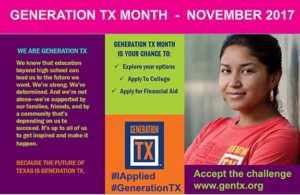 What is Generation TX Month? Generation TX Month combines college admissions and financial aid application efforts into one. Generation TX Month events are designed to take place when schools and community organizations typically host college fairs, financial aid drives, and other college and career-related events. The Generation TX Month provides the perfect opportunity to build on these initiatives around college and career readiness, pull them together to make a broader impact, and expand their reach.
What is Generation TX Month? Generation TX Month combines college admissions and financial aid application efforts into one. Generation TX Month events are designed to take place when schools and community organizations typically host college fairs, financial aid drives, and other college and career-related events. The Generation TX Month provides the perfect opportunity to build on these initiatives around college and career readiness, pull them together to make a broader impact, and expand their reach.
Generation TX Month focuses on getting students, especially those in middle school and high school, thinking about their future with a range of actions and next steps that they can take toward college and career readiness, including:
Prepare (Middle & High School Students)
- Career Exploration
- Finding a Mentor
- Creating a Brag Sheet
- College Visits
- PSAT, SAT, ACT
Apply (High School Seniors)
- College Applications
- Financial Aid Applications
- College Scholarships
Download your planning guide today
The Heart of Texas P-20 Council believes that achieving college and career readiness allows students to reach their fullest potential. By accepting the GenTX challenge the council is acknowledging the focus on the future of our workforce and encouraging them to focus on their goals for college and career. GenTX also provides a college planning and financial aid guide to help parents and students make decisions about the future.
Download College Planning & Financial Aid Guide
Student Tools
- ApplyTexas – If you are applying to a public two-year or four-year institution in Texas, you will need to complete the ApplyTexas application. This application is available at www.ApplyTexas.org. Once completed, you can use this one application to apply to many schools across Texas.
- Applying for Financial Aid – The FAFSA is the primary form you will need to apply for most financial aid
- College Major – What College Major is best for you? Find out at MyMajors After taking this assessment, you will be recommended the top majors, colleges and careers based on your academic achievements, interests and personality.
Generation Texas Month supports the regional efforts and goals of the 60x30TX Texas Challenge to Reach Higher, an initiative to increase college applications, FAFSA completions, and college readiness across Texas.
 This Act Locally Waco blog post was written by Christine Holecek. Christine is an Education Specialist at Education Service Center Region 12 in Waco. She has worked in the area of Adult Education and Career & Technical Education for the past 25 years. She earned an AAS degree from MCC, a BAAS and Master’s Degree from the University of North Texas and is currently enrolled in the Doctoral Program in Educational Leadership and Policy Studies at Tarleton State University.
This Act Locally Waco blog post was written by Christine Holecek. Christine is an Education Specialist at Education Service Center Region 12 in Waco. She has worked in the area of Adult Education and Career & Technical Education for the past 25 years. She earned an AAS degree from MCC, a BAAS and Master’s Degree from the University of North Texas and is currently enrolled in the Doctoral Program in Educational Leadership and Policy Studies at Tarleton State University.
The Act Locally Waco blog publishes posts with a connection to these aspirations for Waco. If you are interested in writing for the Act Locally Waco Blog, please email ashleyt@actlocallywaco.org for more information.
By Christine Holecek
The mission of the Heart of Texas P-20 Council is to assist with the collaboration of education, business, and community to maximize the utilization of resources, programs and services for all students while encouraging a culture of life-long learning. We envision that all students can reach their true potential as happy, healthy, productive and self-sufficient citizens. One local event that helps with this mission is S.T.E.A.M. Day.
The City of Waco, along with ESC Region 12, is hosting its annual S.T.E.A.M. Day on October 11. Geared towards middle and high school students in the Central Texas area, this event helps students explore the fields of science, technology, engineering, architecture, arts and mathematics (S.T.E.A.M.). Participating students will be able to speak directly with professionals about career choices in various fields. S.T.E.A.M. Day is a free, come-and-go exhibition for schools and at the Waco Convention Center. The attendance has continued to grow over the past several years. Last year over 2,200 students from 40 schools registered for the event, along with 86 exhibitors from various career fields. Our exhibitor roster included local manufacturing companies, higher education establishments, engineering and architecture firms, and also high school robotics teams. This event is free to exhibitors as well.
This is an awesome event for students to get a hands-on opportunity to see future careers in action. This event has morphed over the years from “Engineering Day” to “STEM Day” and now “STEAM” Day. This event is held annually in October to inspire students to pursue careers in the community in science, technology, engineering, architecture, art and mathematics. This event is hosted by the City of Waco Public Works Department. This year’s event will be held on Tuesday, October 11, 2017 at the Waco Convention Center from 8 a.m. to 2 p.m.
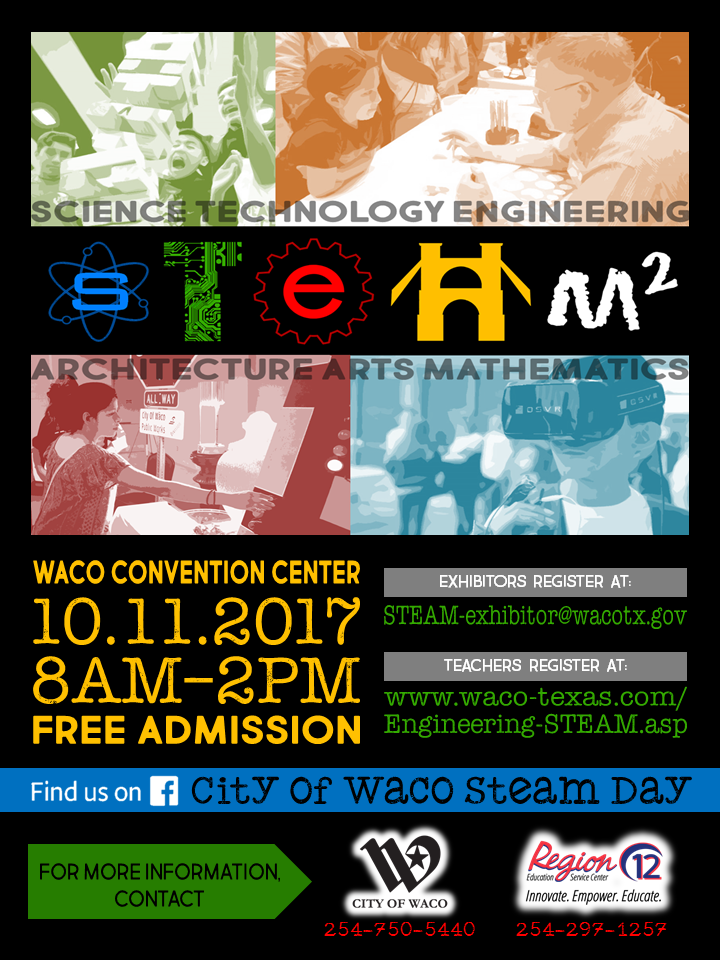
 This Act Locally Waco blog post was written by Christine Holecek. Christine is an Education Specialist at Education Service Center Region 12 in Waco. She has worked in the area of Adult Education and Career & Technical Education for the past 25 years. She earned an AAS degree from MCC, a BAAS and Master’s Degree from the University of North Texas and is currently enrolled in the Doctoral Program in Educational Leadership and Policy Studies at Tarleton State University.
This Act Locally Waco blog post was written by Christine Holecek. Christine is an Education Specialist at Education Service Center Region 12 in Waco. She has worked in the area of Adult Education and Career & Technical Education for the past 25 years. She earned an AAS degree from MCC, a BAAS and Master’s Degree from the University of North Texas and is currently enrolled in the Doctoral Program in Educational Leadership and Policy Studies at Tarleton State University.
(During December we will be reprising some of “2017’s greatest hits” from the Act Locally Waco blog. I couldn’t possibly pick my favorites – so I used the simple (cop out?) approach of pulling up the 10 blog posts that got the most “opens” according to our Google Analytics. It is an intriguing collection that gives at least a little insight into the interests and concerns of Act Locally Waco readers. I hope this “Top 10” idea inspires you to go back and re-read your personal favorites. There have been so many terrific ones… If you would like to see the Top 10 according to Google Analytics, here’s the link: 2017 Greatest Hits. Merry Christmas! — ABT)
By Kassidy Munden
After my first year of college, I began to realize there were things I really (and I mean really) wish I had known in high school to help make my transition to college smoother.
The first thing I would advise any high schooler would be to take the high school anatomy class. I didn’t think I would ever need anatomy in my future profession, or even have to take it in college, but I could not have been more wrong about that. High school students considering going to college should seriously consider taking an anatomy class. My biggest regret about not taking anatomy in high school was that when I got to college, I was far behind my classmates and didn’t know a single thing. You can imagine how well a 100-question test over blood flow in the body went for me three weeks into my freshman year.
 The second thing I would recommend for any high schooler would be to take dual credit in high school. Looking back on high school, that had to be one of the best educational decisions I made to prepare for college. Thanks to dual credit, I had all of my core English classes completed by the time I began college. Not only was it one less major class I had to take, I also learned how to properly write college papers. This helped me in my other classes as well, because in every class, even math, I had to write some type of proper essay. Knowing how to format and write these essays before my freshman year paid off in a huge way. I wish I had known to take more of the dual credit classes my high school offered, because even though they seemed difficult, they were more rewarding in the long run than they seemed at the time.
The second thing I would recommend for any high schooler would be to take dual credit in high school. Looking back on high school, that had to be one of the best educational decisions I made to prepare for college. Thanks to dual credit, I had all of my core English classes completed by the time I began college. Not only was it one less major class I had to take, I also learned how to properly write college papers. This helped me in my other classes as well, because in every class, even math, I had to write some type of proper essay. Knowing how to format and write these essays before my freshman year paid off in a huge way. I wish I had known to take more of the dual credit classes my high school offered, because even though they seemed difficult, they were more rewarding in the long run than they seemed at the time.
The third thing I wish I had known was to take the college transition class offered. Most high schools offer a college transition class and extend the class to all seniors. I did take this class, but I wish I had taken it more seriously. This class teaches students about life in college and how to live on your own, as well as educational enhancements such as how to build a resume. Looking back now, I wish I had learned how to build a proper resume, because that is something I will need for anything and everything. Most freshmen take classes requiring them to build a resume of some sort, and trust me, learning about it in detail in high school is easier than trying to learn it on your own in college.
The fourth and final thing I wish I had known was to get a job or internship. Most high school students declare their major “undecided” when entering their freshman year of college, which is completely normal. However, I wish I had explored more job opportunities and taken internships. These not only look great on a resume but also help you develop an idea of what you might actually want to get a degree in. Having more of a background in several different positions makes you a more diverse and knowledgeable individual. Did I mention it also will give you a stronger resume when you apply for college? That is key for all aspiring college students.
High school is a profound experience-building time for everyone, and I highly recommend that college-bound students seek out all of the opportunities available, because they definitely will pay off in the long run.
 Kassidy Munden is a summer intern at ESC Region 12 in the College and Career Readiness/CTE department. She is a student at Texas Tech University and wanted to share her wisdom with current high school students.
Kassidy Munden is a summer intern at ESC Region 12 in the College and Career Readiness/CTE department. She is a student at Texas Tech University and wanted to share her wisdom with current high school students.
By Christine Holecek
 The mission of the Heart of Texas P-20 Council is to assist with the collaboration of education, business, and community to maximize the utilization of resources, programs and services for all students while encouraging a culture of life-long learning. We envision that all students can reach their true potential as happy, healthy, productive and self-sufficient citizens.
The mission of the Heart of Texas P-20 Council is to assist with the collaboration of education, business, and community to maximize the utilization of resources, programs and services for all students while encouraging a culture of life-long learning. We envision that all students can reach their true potential as happy, healthy, productive and self-sufficient citizens.
We believe that achieving college and career readiness allows students to reach their fullest potential. Continual improvement of teaching and learning processes is a key ingredient to success. We also believe that the economic vitality of the region is interdependent, requiring the collaboration of education, business, and community resources.
Below is the HOT P-20 profile of a high school graduate. It is meant to encourage dialogue between students, teachers, counselors, parents and community members in planning for college career and beyond. The HOT P-20 Council, through the *AVATAR Project (a project that invites high school teachers/counselors to meet with Higher ed teachers/counselors to coordinate their work) has adopted this profile utilizing a document created by Waco ISD several years ago. This document provides talking points and suggestions. This document is a work in progress and will be updated annually as part of the HOT P-20 Regional Council strategic.
Profile of a High School Graduate
A responsible decision maker
- Who uses creative problem-solving and conflict resolution kills effectively
- Who uses critical thinking, knowledge and reasoning to effectively evaluate information and make sound decisions
A confident life-long learner
- Who demonstrates mastery of skills in the core content areas
- Who analyzes, evaluates, and applies new information
- Who is an inquisitive self-learner
A healthy individual
- Who practices emotional and physical wellness, including nutrition, hygiene, sexual responsibility, and physical fitness
- Who demonstrates responsible life management skills in social, interpersonal and family relationships
- Who manages time, money, environmental and other resources in a responsible and effective manner
A literate communicator
- Who is proficient in academic and technological skills
- Who effectively expresses ideas using a variety of methods, including written and spoken languages, mathematics, science and the arts
- Who is multilingual
- Who uses appropriate social and interpersonal skills to effectively communicate in a global society
An informed citizen
- Who promotes democratic principles in a multicultural society
- Who demonstrates patriotism and citizenship through community service and participation in the democratic process
- Who understands, respects, and values all cultures
A productive worker
- Who generates quality goods and services
- Who demonstrates adaptability
- Who practices a good work ethic
- Who demonstrates leadership and participation skills
- Who takes ownership of his/her future through goal setting, decision making, and efforts aimed at continual improvement
A well-rounded individual
- Who is guided by honorable values, morals, and ethics
- Who demonstrates an appreciation of, and participation in, the arts
- Who displays genuine global, cultural, and spiritual awareness and respect
- Who is accountable for his/her actions
If you would like to get involved in the conversation or join our initiatives contact our new chair for 2017-2018 school year, Dr. Scott McLanahan. He can be reached at scott.mclanahan@wacoisd.org. Initiatives for 2017-2018 include Vertical Alignment (AVATAR project), Groundhog Job Shadow Day, Waco ISD/Prosper Waco Internship Program and the Annual State of Education Conference. For more information on the HOT P-20 council: www.hotp20.org.
 This Act Locally Waco blog post was written by Christine Holecek. Christine is an Education Specialist at Education Service Center Region 12 in Waco. She has worked in the area of Adult Education and Career & Technical Education for the past 25 years. She earned an AAS degree from MCC, a BAAS and Master’s Degree from the University of North Texas and is currently enrolled in the Doctoral Program in Educational Leadership and Policy Studies at Tarleton State University.
This Act Locally Waco blog post was written by Christine Holecek. Christine is an Education Specialist at Education Service Center Region 12 in Waco. She has worked in the area of Adult Education and Career & Technical Education for the past 25 years. She earned an AAS degree from MCC, a BAAS and Master’s Degree from the University of North Texas and is currently enrolled in the Doctoral Program in Educational Leadership and Policy Studies at Tarleton State University.
The Act Locally Waco blog publishes posts with a connection to these aspirations for Waco. If you are interested in writing for the Act Locally Waco Blog, please email ashleyt@actlocallywaco.org for more information.
By Fred Hills
Preparing local students for successful journey through school and college to careers is critical to the well-being and growth of our community. Started 8 years ago, the HOT P-20 works to promote streamlined, transparent degree pathways for students to move quickly and successfully through their education and onto college and/or a career. The Heart of Texas (HOT) P-20 brings together representatives from the independent school districts (ISD), institutions of higher education (IHE), Region 12 Education Service Center, industry and government across six counties: Bosque, Hill, Falls, Limestone, Freestone and McLennan to work towards this goal. Among the higher education representatives are McLennan Community College, Texas State Technical College, and Hill County with representation from both Tarleton State University, Texas Tech through MCC’s University Center.
The HOT P-20 mission can best be summarized as follows:
- Collaborating by building cross-community team to address education and career possibilities for all students.
- Informing our diverse communities about ongoing initiatives, best practices and available resources.
- Advocating for educational best practices with at the state and local levels.
Some of our ongoing projects include:
- Academic Vertical Alignment Training and Renewal (AVATAR) program that brings together faculty from the high schools and post-secondary institutions who teach Math, English, College and Technical education, and STEM to discuss differences in instructional techniques and ways to better prepare students for college-level work while in high school. AVATAR also include high school and college counselors to address ways to better advise students in preparation for their transfer to college and/or a career.
- Building closer ties between education and industry under our Groundhog Job Shadowing initiative celebrated on February 2 each year promoting job shadowing, internships, externships, career fairs and industry visits.
- Partnering to support local educational initiatives and programs such on Region 12 ESC’s Connect 3, Teacher’s Gone Tech, Girls in STEM, career fairs, etc.
- Building collaborative agreements among secondary, post-secondary and industry to offer degree pathways and college preparation courses for students while still in high school.
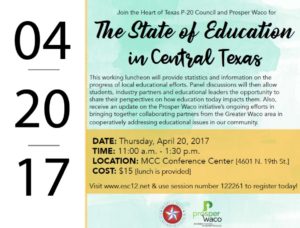 Providing an annual forum on “State of Education in Central Texas” in the Spring to share ongoing educational initiatives and career preparation opportunities. This year’s event is scheduled for April 20 from 11:30 to 1:30 PM at MCC’s conference center. All are welcome.
Providing an annual forum on “State of Education in Central Texas” in the Spring to share ongoing educational initiatives and career preparation opportunities. This year’s event is scheduled for April 20 from 11:30 to 1:30 PM at MCC’s conference center. All are welcome.- Working with Prosper Waco and the Waco Chamber to inform them on ongoing educational initiatives and promote education to career programs.
- Surveying the community for ways to better serve all partners in this effort.
HOT Regional P-20 operates as a voluntary organization. For more information on the HOT P-20 and its programs, check out our webpage at http://www.hotp20.org
 Dr. Fred Hills is the current president of the HOT P-20 and Dean of Arts, Science and Business at McLennan Community College. He has worked and lived in the Waco community for over 20 years and has served on the HOT P20 for the last four years.
Dr. Fred Hills is the current president of the HOT P-20 and Dean of Arts, Science and Business at McLennan Community College. He has worked and lived in the Waco community for over 20 years and has served on the HOT P20 for the last four years.
The Act Locally Waco blog publishes posts with a connection to these aspirations for Waco. If you are interested in writing for the Act Locally Waco Blog, please email ashleyt@actlocallywaco.org for more information.
By Hermann Pereira
When I entered into the education field 10 years ago I thought to myself, “Next year I will find a real job…” I had studied business administration at Stephen F. Austin and thought the corporate world was where I wanted to spend my career. We had moved to Waco and I figured teaching would be easy. Boy, was I wrong! Being an educator was challenging and rewarding and I was hooked early on. I followed my wife into the profession after I saw the influence she had in the classroom and as a coach. I wanted to do the same for students that looked like me and ones that came from blue collar families like me as well. I found my motivation to impact young people’s lives early in my teaching career at West ISD. Then, as I began working at Connally ISD, I realized my motivation to impact others needed to be broader. That led me to Baylor University where I earned my Master’s degree in Educational Administration.
I have been blessed to lead the team at Connally Career Tech for the past year and it has been one of the most rewarding things I have ever done. We have had success in a short amount of time and I think that all boils down to a few key ingredients: motivation and partnerships.
Motivation is key
More than three years ago Connally ISD decided to think outside of the box. They created Connally Career Tech Early College High School. Leaders at Connally were motivated to serve the students at Connally ISD in a unique way because the reality is not every student has the desire to attend a 4-year university. We are a school within a school model, which means students can experience high school sports and activities and attend college classes. One important feature of our campus is that all tuition, books and supplies are free to the families so cost is not a barrier to students. All students from Connally High School can apply to be a part of our campus if they have the desire to enter into one of our career clusters. Those clusters consist of Construction, Computers, Criminal Justice, Drafting, Healthcare, Manufacturing, Technology, Transportation Technology or Visual Communications. Once students show an interest in these fields we educate them on what types of opportunities they may have if they study one of these fields.
Students are learning hands on career skills in a certain field as well as soft skills that will help them to become the very best in their chosen industries. We have seen that once students begin working in an industry for which they feel a passion, their motivation will push them to achieve more than they would have ever imagined. Students receive extra support and guidance in a “small school feel” from teachers and faculty due to the Early College High School (ECHS) model that we follow. Some students will finish with college hours in a career field, some will complete certifications or an Associate’s degree in a certain field. Either way they are realizing that these opportunities are generation changers.
Partnerships
Connally ISD is fortunate to be part of the greater Waco area which is filled with people, companies, higher ed institutions and other organizations that are ready and willing to partner with the efforts of all schools. For schools like ours, that make college hours available to students, it all begins with our higher education partners. Texas State Technical College was the first college partner that opened its doors and made its programs available to our students. On TSTC’s Waco campus, Connally Career Tech students are able to earn certificates and Associate’s degrees in high demand technical fields. Our students are able to learn from the best professors and are able to experience top notch facilities in these different fields. Our focus on career readiness also led us to a partnership with McLennan Community College that will kick off this upcoming fall. With this new partnership Connally Career Tech students will be able to choose from a number of public service careers. Our students will have the opportunity to earn certificates and possibly Associate’s degrees in industries such as health care and emergency service fields. Recruiting is almost over for next school year and we have had a great deal of interest from families about our new career offerings.
In a short amount of time we have found that members of the community are eager to partner with us to help create more well-rounded, career driven students. So far we have relationships with large companies, small local businesses, and nonprofits who are providing mentoring, opportunities to serve those in need, career guidance, supplies for clubs and activities, and paid internships. These key relationships have been fostered through our active advisory board at Connally Career Tech.
In my conversations with students I try to stress to them that in a few short semesters they will be walking the stage as Connally ISD graduates and we all will be proud of them. Students are motivated to finish high school, but what I emphasize is that they need to make sure they are college and/or career ready before they shake my hand on stage. Our career driven campus serves students in our school district well, but it is also something that could be replicated. Hopefully in the coming years other local school districts will choose to embark on a similar journey, and when they do Connally Career Tech will be there to partner with them.
 Hermann Pereira is the Principal of Connally Career Tech Early College High School and has been in education for 10 years. He is a Houstonian who roots for all Houston sports teams but has called Waco home for the past decade. He has been married to Kristi for 13 years and has two children, Hudson who is 8 years old and Ruby who is 5 years old.
Hermann Pereira is the Principal of Connally Career Tech Early College High School and has been in education for 10 years. He is a Houstonian who roots for all Houston sports teams but has called Waco home for the past decade. He has been married to Kristi for 13 years and has two children, Hudson who is 8 years old and Ruby who is 5 years old.
By Donna McKethan
Each year, Americans celebrate Groundhog Day on February 2. For the past 131 years, we’ve had a day celebrating a rodent! Time to upgrade our celebration!
February 2 is also National Job Shadowing Day. Championed by national organizations, state organizations and our local Heart of Texas P-20 Council, National Job Shadowing Day provides students a unique peek into careers. It’s a great way for them to learn from people already in the work place, to get some perspective about life in the work world, and to get a true feel for the career they plan to pursue in the future.
Shadowing experiences provide several advantages students. Students are able to observe firsthand the occupational duties and expectations of their career choice. This experience provides students an information base to assist in career decisions that are more compatible with their personal interests and skills. Other benefits include:
- increased motivation to excel in school;
- broadened understanding of requirements of a specific occupation in the “real” world;
- increased self-confidence in working with adults and in job interviews;
- improved positive self-image;
- a chance to develop leadership skills.
Recently Waco High Academy of Health Science students took part in a job-shadowing experience provided by Baylor Scott and White Hospital. The experience was enjoyed by both the hospital staff and the students. I’ll let the students speak for themselves about what they learned:

Marilyn Rangel
Marilyn Rangel: I shadowed two nurses at Baylor Scott and White Hospital. I got first-hand experience at what they do on a day-to-day basis in Pediatrics. I really loved the experience! I am really grateful I got a chance to experience something like this.

Hallie Morgan
Hallie Morgan: At Baylor Scott & White I had the chance to shadow a nurse manager in the 5 South floor. While I was shadowing, we checked on the nurses and how they were doing. We also checked on patients because they were short-handed that day. This experience really meant a lot to me because I got to see that there are other jobs in a hospital besides being a nurse or doctor.

Yenesia Carpio
Yenesia Carpio: At Baylor Scott & White, I learned many interesting things. I shadowed in the Radiology department. I got to see how a mammogram works. I even learned how long you would have to go to college to become a mammography tech. Shadowing at Baylor Scott & White was very helpful to me because it opened my eyes to more careers that I may want to do in the future.
 Kevin Sifuentez: I visited the Baylor Scott & White Medical Center and got to see the laboratory. It was very interesting. I got to see how they test for HIV and pregnancy. I also got to see where they put all the blood samples, including ones from Carter’s blood drives. This experience meant a lot to me and I hope to get the chance to do it again soon.
Kevin Sifuentez: I visited the Baylor Scott & White Medical Center and got to see the laboratory. It was very interesting. I got to see how they test for HIV and pregnancy. I also got to see where they put all the blood samples, including ones from Carter’s blood drives. This experience meant a lot to me and I hope to get the chance to do it again soon.

Thomas Ramirez
Thomas Ramirez: When we arrived to Baylor Scott & White, we were taken to the auditorium for a short orientation. We each got our job-shadowing assignment. I was assigned to the NICU, where they take care of sick and premature babies. I shadowed a nurse who was taking care of a set of twins. While there, I learned about the many types of jobs in the NICU and got to watch them feed and bathe the infants.

DestinyAcevedo
Destiny Acevedo: At Hillcrest Baylor Scott & White, I shadowed Megan in the clinical nutrition department. I learned that there is a lot of math involved in nutrition. I thought it was just about food, but they watch every patient and plan what they eat according to their nutritional needs. They really care about the patients’ health. This was a great experience, and I like it very much.
Just a few short hours are all it takes to open a window into the real world of work for students. Groundhog Job Shadow Day can be an important first step in providing students with the knowledge and skills they will need to achieve their dreams. Special thanks to Baylor Scott and White, The Heart of Texas P-20 Council and Waco High School Academy of Health Science for making this day possible. If you are interested in hosting students for a shadowing experience at your work place, contact me at donna.mckethan@wacoisd.org.
In the words of Punxsutawney Phil, “BE the shadow!” and everyone will benefit.
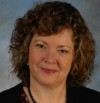 Donna McKethan is the Career and Technology Director at Waco ISD. She has 33 years in education, the last 15 with WISD Career and Technology. She is currently the President of The Career and Technology Association of Texas. She is a WISD graduate with a BS in Home Economics Education from Baylor University and an MS of Education from Tarleton State University. She is currently enrolled in the Doctorial Program in Educational Leadership at Tarleton State University.
Donna McKethan is the Career and Technology Director at Waco ISD. She has 33 years in education, the last 15 with WISD Career and Technology. She is currently the President of The Career and Technology Association of Texas. She is a WISD graduate with a BS in Home Economics Education from Baylor University and an MS of Education from Tarleton State University. She is currently enrolled in the Doctorial Program in Educational Leadership at Tarleton State University.
The Act Locally Waco blog publishes posts with a connection to these aspirations for Waco. If you are interested in writing for the Act Locally Waco Blog, please email ashleyt@actlocallywaco.org for more information.
By DeShauna Hollie
I’ve always liked the phrase “It takes a village to raise a child”. Most of us have heard that phrase at one point or another in our lives. It is a phrase that often comes to mind when I think of our educational system, in fact I would go so far as to say that “it takes a village to educate a child.” Over the past century we have done a phenomenal job in establishing an educational system that not only educates large numbers of students, but that is also continually striving to understand how to give each student the best education experience possible from early childhood through college.
Along with giving all students access to good teachers and quality curriculum, research also indicates that strong community support is one of the pivotal pillars of a successful educational system. (Darling-Hammond, 2010) This community support can look like a lot of things. For example in our own community we have a plethora of wonderful support systems that include but are not limited to:
- Mentoring programs
- Parent teacher organizations
- Local and national nonprofits that take an active interest in our local schools
The community groups make up our village and make it possible for our teachers and administrators to focus on the great work that they are doing inside of the classrooms. We have laid a strong foundation for each student’s educational success. With these support systems in place we can now move on to the next phase of the work in providing each student with the best educational experience. That work includes helping students and families better connect their high school education with their college and career goals.
Using the model of collective impact Prosper Waco and MCC are actively engaged in multiple exciting initiatives to address the overarching goals of increasing college completion rates of students in McLennan County. With a grant from the TG Foundation we are using these questions to guide us in our work:
- How do we raise the college completion rates of economically disadvantaged students?
- How do we raise the college completion rates of Men of Color?
- How do we provide information in a way that aids in a seamless transition for students from high school into college and into their career field so that they may take their places in society?
Again I’ll mention that it takes a village to educate a child. As a Waco local who also happened to have been a first generation college student myself, I know firsthand what it is like to navigate the paths between high school, college and career with community guidance. In the coming weeks we will delve further into all the ways that we are working towards the goal of increasing college completion rates for Mclennan County students.
 DeShauna Hollie is the Pathways Specialist with the Project Link program. She is currently working on Master’s of Arts in Curriculum and Instruction at Greenville College. She is also an aspiring hops farmer and really likes riding her bike.
DeShauna Hollie is the Pathways Specialist with the Project Link program. She is currently working on Master’s of Arts in Curriculum and Instruction at Greenville College. She is also an aspiring hops farmer and really likes riding her bike.
The Act Locally Waco blog publishes posts with a connection to these aspirations for Waco. If you are interested in writing for the Act Locally Waco Blog, please email ashleyt@actlocallywaco.org for more information.
Notes: Darling-Hammond. (2010). The Flat World and Education: How America’s Commitment to Equity Will Determine Our Future. New York: Teachers College.
